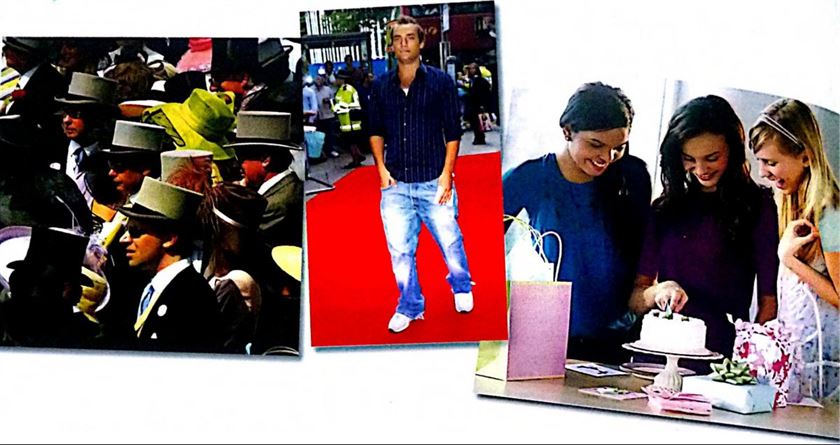FCE cloth type and fashions listening part 3
صفحه ی دوازده و سیزده کتاب اف سی ای گرامر و لیسنینگ

Vocabulary 3: Clothes
1 How many of the items of clothing in the photographs can you name? DO IT NOW

The following adjectives can be used to describe clothes. Which of them can you match to the photographs? FIND THE MEANING OF EACH
tight-fitting / trendy / casual / sleeveless
formal / baggy / unfashionable / plain
tasteful / colourful / scruffy / smart
Multiple matching, part 3 FCE Listening
You will hear five different people talking about occasions when a person’s clothes and appearance caused surprise or concern. For questions 1–5 , match the speaker to the correct occasion in the list A–H . Use the letters only once. There are three extra letters which you do not need to use.
Before you do the task …
Prediction
1 Match each of the people in the box to the appropriate occasion A–H in the listening task. More than one word may be used for each occasion and some words may be used twice .
e.g . A wedding: guest, witness
What other people might you also find in each of the situations? Talk about other situations
e.g. At a wedding the people who get married are the bride and groom.
guest
spectator
audience
competitor
witness
star
candidate
host
invigilator
opponent
2 Where does each occasion take place?
e.g. A wedding usually takes place in a church or a registry office.
3 What clothes would you personally
wear on the occasions A–H mentioned in the listening task?
e.g. If I was going to a wedding, I would buy an expensive dress. I would probably wear high-heeled shoes.
You need to ask these questions, then it would be easier to find the speaker.
Now you are ready to do the task.
What to expect in the exam
You will have 30 seconds to read the eight options. Use this time to try to predict some of the ideas and language you might hear.
Some of the extracts may contain distractors (key words or expressions which could cause you to make the wrong decision). Pay close attention both times you hear the recording.
A a wedding
B a friend’s birthday party
C a classical ballet
D a sporting event
E a film premiere
F an examination
G a job interview
H a special family meal
Speaker 1
Speaker 2
Speaker 3
Speaker 4
Speaker 5
Have you ever been in a situation where someone’s appearance caused surprise? Talk about your memory
Language focus 2: Be used to, get used to and used to
Be used to/Get used to + noun or gerund
Be used to + noun/gerund means 'be accustomed to'.
She's a nurse so she's used to seeing sick people.
Get used to + noun/gerund means 'become accustomed to'.
I want to leave Athens; I can't get used to the heat.
1 Look at the following sentences from the listening. In which of them does used to
a mean ‘accustomed to’?
b refer to a past state which has now finished?
Write a or b in the gap
1 Her unconventional, yet practical clothing shocked spectators, who were used to seeing women play in the long, heavy dresses which were typical of that period.
2 And he used to live in France, which means he probably wouldn’t mind changing countries if we needed him to.
3 …he will have to get used to wearing something a little more formal.
2 What is the difference in meaning between be used to and get used to?
find the meaning
3 What form of the verb is used after be used to and get used to?
Talk about all the things you have to get used to in the following situations: DO IT NOW
- you get your first job
- you become famous
- you go on a diet
- you get married
- you have children
- you retire
Example:
In a new job, you might have to get used to working together with other people.
5 a If you went to live in Britain, what aspects of life there would you find it difficult to get used to? TALK ABOUT IT NOW
B Read the following text about Juan, who moved from Spain to live in England. Ignore the gaps for the moment. How many of the things which you spoke about in A are mentioned? DO IT
Now that Juan has been living in England for five years he (0)is used to doing (do) things differently, but it hasn’t always been the case. When he first moved there he couldn’t (1) used to (have) lunch at 1pm, so he often (2) used to (cook) for himself in his flat and eat at 3pm, as his family does in Spain. Even now I don’t think he (3) used to (eat) English food, because when he comes home to Madrid, he buys Spanish ‘delicacies’ to take back with him.
I remember how he (4) used to (write) to me and complain about the shop closing times. It took him a long time to (5) used to not (be) able to buy anything after about five o’clock. Most shops in Spain close at eight or nine in the evening.
He bought an English car a year ago, so he should (6) used to (drive) on the left by now. I wonder if he’ll ever be able to (7) used to (drive) on the right again when, or if, he comes back to live in Spain!
Read the text again.
In the first gap write either be, is , get , or leave it blank ( - ).
In the second gap write the correct form of the verb in brackets.
There is an example at the beginning (0).
What do you think a British person coming to your country might find it difficult to get used to? TALK ABOUT IT


